-
NEW ITALIAN CINEMA (SFFS 13-20 Nov. 2011)
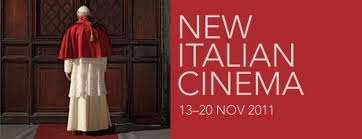
NEW ITALIAN CINEMA (SFFS 13-20 NOV 2011)
The San Francisco Film Society presents this series, a program of a dozen films, with 8 new films in competition for the audience-balloted City of Forence Award. These are:
2 CIGARETTES Aureliano Amadei 2010 94 min
FATHER AND THE FOREIGNER, THE Ricky Tognazzi 2010 107 min
FIRST ASSIGNMENT, THE Giorgio Cecere 201 90 min
JEWEL, THE Andrea Malaoli 2010 110 min
ONE LIFE, MAYBE TWO Alessandro Arondino 2010 88 min
QUIET LIFE, A Claudio Cupellini 2010 103 min
SOME SAY NO Giambattista Avellini 2011 95 min
WORLD IS FOR YOU, THIS Francesco Falaschi 2011 82 min
In addition the director Daniele Lucchetti is featured with these three films:
OUR LIFE Daniele Lucchetti 2010, 98 min
(Opening night)
GINGER AND CINNAMON 2003 103 min
IT'S HAPPENING TOMORROW 1987 87 MIN
And the special closing night film will be:
HABEMUS PAPAM (We Have a Pope) Nanni Moretti 2011 102 min
I already reviewed that one from Paris last month.
Last edited by Chris Knipp; 11-27-2011 at 10:39 AM.
-
DANIELE LUCHETTI: OUR LIFE (2010)
NICE is the acronym for the New Italian Cinema series presented by the San Francisco Film Society.

ELIO GERMANO IN OUR LIFE
Getting away with working class graft
Italians are crooked and only care about money, is what several foreigners tell Roman construction worker Claudio in this engaging if somewhat slapdash and too easily resolved tale, whose indestructible protagonist is played by Elio Germano, the older brother in Lucchetti's richer and more successful political family chronicle from 2007, My Brother Is an Only Child. Like that film this one is a vivid artifact of Italian life, this time of the present moment. Even more than before, Lucchetti makes things too easy and breey; again he steeps the action in humor, warmth and the sound of Roman dialect.
The screenplay gets Claudio into a terrible mess and then in a rapid succession of spliced-together final scenes delivers him from it without a scratch. First his wife (Isabella Ragonese) dies giving birth to their third child. At the funeral, with everybody else -- but the cozy handheld camera used throughout focuses only on him --he screams out the raucous song he and his wife liked to sing between sex sessions, Vasco Rossi's "Anima fragile." But once that's out of the way the scrawny, smiley Claudio sheds barely a tear.
More a bother for Claudio than the loss of his wife but also a benefit is the foreigner at the building worksite, a Romanian, who he finds buried at the bottom of an elevator shaft. A watchman, the man died in a fall, and the boss hid the body because the site might have been shut down otherwise for employing illegal workers. Greedy, Claudio half-blackmails his boss Porcari (Giorgio Colangeli) into giving him a whole building project. But he has to morrow the money from his pimp-drug dealer neibhbor Ari (Luca Zingaretti) and must hire illegal aliens as the workers. Their work is lousy. Ari's Senegalise ex-whore girlfriend takes care of Claudio's kids, including the two cute young boys and Vasco, the baby. Also in and out of the scenes is their controlling sister Loredana (Stefania Montorsi).
Meanwhile the dead Romanian's wife Gabriela (Alina Madalina Berzunteanu) and her son Andrei (Marius Ignat) turn up. Embarrassing? Not for Claudia. He fixes up Gabriela with his handsome loner brother Piero (Raoul Bova) and hires her incompetent chubby son on the construction site.
As the project goes from one disaster to another, the film cuts rapidly from scenes at work to domestic developments. We have to believe the heard-hearted Porcari's change of heart and the family members' chorus of "We are here," meaning they will always bail Claudio out, as somehow they do. Illegal money sifts in from all directions, a new crew is hired, of illegal but more expensive and more reliable emergency Italian workers, and, well, Claudio has a good cry and everybody's happy. Whether his idea that material success would make up for his kids the loss of their mother is a dumb one or just needs more successful hustling to come through is a question that is not dealt with. The film makes hasty social and political points at the cost of emotionally connecting with the audience.
The hasty, handheld and jump-cut resolution is ridiculous, but somehow this film's content is awfully Italian, not least the tricky deals and tax dodging, as well as the racism, the problems with foreigners, the illegal workers, and the loyalty of family. Though he's too shrill and manic here, and registers too few real emotions, Germano is a talented actor, and the other cast members are confident and appealing. The action, however rushed and too easily resolved, is thrown at us with energy and momentum. So that, in Italy's lackluster current movie scene, will have to do.
Our Life/La nostra vita was in competition at Cannes 2010 and Elio Germano shared the Best Actor prize for his performance in the film with Javier Bardem (for Biutiful). Screened for this review as a part of New Italian Cinema, a series presented by the San Francisco Film Society at the Embarcadero Cinemas, San Francisco, 13-20 November 2011. Our Life was the opening night film, starting off a mini-series of Lucchetti films and shown at 6:30 9:30 November 13.
Last edited by Chris Knipp; 11-18-2011 at 09:50 PM.
-
CLAUDIO CUPELLINI: A QUIET LIFE (2010)

TONI SERVILLO IN UNA VITA TRANQUILLA
Things are not what they seem
This is a slow-burning thriller and it has one of the best Italian actors of recent years in it, Toni Servillo of Il Divo, Gomorrah, The Girld by the Lake, and The Consequences of Love. He is Rosario, an Italian running a nice hotel and restaurant in Germany, with a German wife Renate (Juliane Kohler ) and a nine-year-old son. His past comes back with the arrival of Diego (Marco D'Amore) and Edoardo (Francesco Di Leva) two burly and explosive young men. One of them turns out to be Rosario's grown and resentful son, whom he has not seen for many years. Rosario is delighted to see Diego, but he and his "colleague" are obviously up to no good. A few words Rosario speaks to his son show he too has been in big trouble, so the atmosphere of quiet and respectability can quickly be broken if circumstances cause him to slip back into the old mode.
Cupellini creates a constant atmosphere of danger and trouble on the way -- even sous-chef Claudio (Maurizio Donadoni) seems potentially violent -- while maintaining a sense of underlying calm and routine and not overdoing anything. Servillo dissolves into this mysterous ex-pat life as he does with all his roles. He has a look of polite indifference, but turns on a charming smile for important guests. He lights up whenever he looks at Diego -- until things change. The cinematographer, Gergely Poharnok, makes judicious use of reflections to hint that nothing is as it seems. Heavy Neapolitan accents in a German resort area itself conveys menace..
Servillo's role here could be seen as a variation on Paolo Sorrentino's elegant The Consequences of Love, where he is explicitly a mafioso exiled, in quarantine, but here rather he is is hidden away, living a new life, "a quiet life." The obvious danger is that he can slip back into the old mode if the old dangers and violence break into the quiet. Comparisons are odious, but it's obvious that the cold, routinized character Servillo plays in Sorrentino's film is less appealing, but more interesting than this warmer fellow, and this is more a conventional thriller. But it provides pleasures nonetheless. When the trouble starts it's not half over. And for those of us choking on blockbusters, it's a treat to see a thriller that's a slow burner that's character-driven. In the plotline, as it finishes, there's a pleasing aftertaste of Patricia Highsmith. This, like The Consequences of Love, takes a little to long to end, but it's an excellent sophomore effort by Cupellini, and not only Servillo (as usual) but D'Amore and di Leva, a well-matched pair, interesting and complex characters who far more than just young gangster types. (Renate is a bit underdeveloped as a character.)
Screened for this review at the New Italian Cinema series presented by the San Francisco Film Society, running 13-20 November 2011 at Embarcadero Cinemas, San Francisco. (Another film in this series stars Toni Servillo: Andrea Molaioli's The Jewel/Il gioiellino. )
Last edited by Chris Knipp; 08-03-2014 at 03:07 AM.
-
ANDREA MOLAOLI: THE JEWEL (2011)
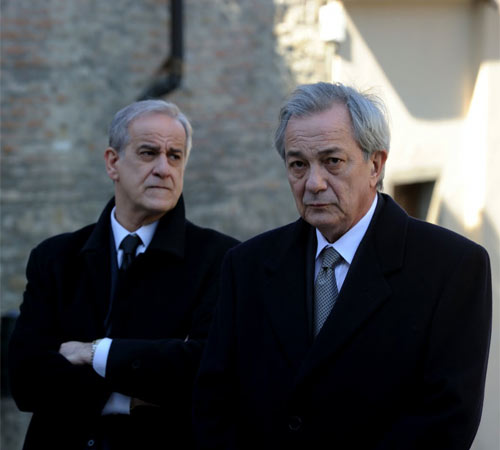
TONI SERVILLO AND REMO GIRONE IN THE JEWEL
"We'll make it all up"
The Jewel/Il gioiellino reunites Andrea Molaioli with the great Toni Servillo, whom he directed in his previous film, the much-celebrated 2007 "existential" police procedural, The Girl by the Lake/La ragazza del lago, which I reviewed as part of the Lincoln Center New Italian Cinema series in New York in June 2008. Molaioli previously worked a lot with Nanni Moretti, which may help explain his interest in social and political issues. This new film is based on the true story of the bankruptcy of the Italian company Parmalat. Servillo plays Ernesto Botta, the chief financial officer, the right hand man of the boss Amanzio Rastelli (Remo Girone). The names are changed, the events would be familiar to Italians.
Rastelli, who has the regal air of a captain of industry, inherited a sausage factory from his father and grandfather and in several decades, by the Eighties, turned the business into a multinational food conglomerate and global dairy producer called Leda. It's the "little jewel." But Leda is like the Lehman Brothers surrogate in the new film Margin Call, only instead of credit default swaps, the weak underpinning that can't survive the stock market boom's sudden fade is a network of bribes of politicians and financial authorities. LIke the Depression era Ponzzi schemer in the recently revived 1963 Terence Rattigan’s drama Man and Boy, Rastelli and Botta are swinging back and forth, between Moscow and New York in this case, trying to raise the money to stay afloat, and the cops are waiting in the wings.
Officers of the company waste money on luxuries, and Rastelli has his football team and airplanes. Botta mostly just watches and frowns: Servilli's performance is a controlled display of bitchy temperament. You should hear the language he uses when he talks to American bank officials, in English -- he can't hear himself. He fights Rastelli's neice Laura (Sarah Felberbaum) when she's put in his office. Then she turns out to be smart and he has an affair with her. Perhaps it's to make this seem more plausible that much older Servillo wears a hairpiece for this role. But it doesn't work: the affair seems sterile and worse yet, a narrative misstep. For a while this turns into a portrait of Botta. Maybe the filmmakers just became overly fascinated with the by now famous Servillo. He can anchor the film but the story is not about him. An episode in which Botta and Laura confront an American bank officer in New York verges on the absurd.
Like The Girl by the Lake this film takes its time and rambles, and this time some of the sequences are of dubious value. It's nothing like Margin Call, which stunningly depicts a spectacular failure that takes place in 24 hours. We watch Leda hovering on the verge of failing for years, and if this weren't a financial thriller, if it weren't the very timely story of a major crime, this could be a very dull movie. Rastelli keeps bringing the company back from the brink, and when he finally gives up Botta jumps in. "We'll make it all up," Botta finally says. Filippo Magnaghi (Lino Guanciale), the young commercial director, sees through the imposture, can do nothing about it, and jumps off a bridge. As he and another executive are take away in the paddy wagon, another executive says, "We had some golden years, though, didn't we?" Botta just glowers into the distance. This film has its flaws, but it's timely and it's got the steely ill humor of Toni Servillo, and the crocodile endurance of Remo Girone, as his boss, is a strong performance too. The corporate design credits -- logos, products, publicity, the grand company offices -- are also all very well done. Several scenes in a Russian church and in the snows of Moscow are handsome. The picture is nice to look at.
Screened for this review as part of the New Italian series presented November 13–20, 2011 at Landmark's Embarcadero Center Cinema by the San Francisco Film Society. The other film in this series starring the remarkable Toni Servillo is A Quiet Life, a crime thriller directed by Claudio Cupellini.
Last edited by Chris Knipp; 07-31-2017 at 01:08 AM.
-
GIAMBATTISTA AVELLINO: SOME SAY NO (2011)
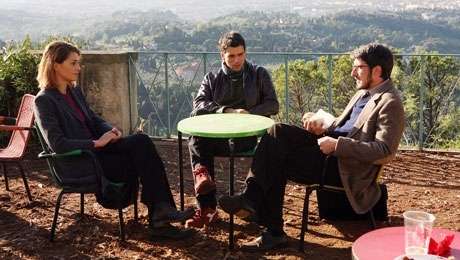
PAOLA CORTELLESI, LUCA ARGENTERO, AND PAOLO RUFFINI IN SOME SAY NO
"These things in Italy aren't Mafia; they're normal"
Some Say No is a new Italian comedy with a very serious subject: the way the country's society is corroded by favoritism that pushes inferior people to the top in virtually every field. In Florence, three thirty-somethings band together to wage their own war on the system. Each of them is a person of talent who has been pushed out by "favorites" or raccomandati, people who have muscled in on the promotions they ought to have gotten by pulling strings.
Max (the handsome, energetic Luca Argentero) is a talented journalist on a local daily newspaper, just about to be permanently hired, when the daughter of a famous writer gets his job and his boss is too spineless and dependent on the preference system to oppose the move. Irma (Paola Cortellesi, underrepresented here) is now one of the best younger doctors at her hospital. She is just about to sign onto a permanent contract when the head physician’s new Australian girlfriend (Harriet MacMasters-Green) receives the post instead. Samuele (Paolo Ruffini, the real comic actor of the three) is a brilliant young expert on penal law. After years of virtually unpaid scholarship and teaching, he's just learned that his academic chair is going to his boss’ sleazy and thoroughly incompetent Lothario of a son-in-law. Ten years of exams, degrees, and fine performance in training positions have added up to nothing for this frustrated trio. They're hopping mad.
Max, Irma and Samuele compare notes and decide to get revenge on the three who have usurped their rightful positions, trading victims to avoid detection. They call their little band, which later on they hope to expand into a movment, "The Pirates." Samuele's stipulation is that they commit no high crimes. However, they don't stick to that rule. Things go so well Samuele hires local gangsters to harras Irma's rival and her porky husband. Max winds up wooing the woman reporter who got his job, as well as, briefly, Irma. Since the victims -- especially the head doctor and his Australian wife -- have had their pet birds disappeared and mock-roasted and their front door walled up -- have protested to the authorities, this also turns into a comical fumbling police procedural. It is not by accident that the filmmakers have the cops distracted by this minor matter from investigating the serious threat of Eastern European gangster activity.
This plot exists to deride and mock various Italian contemporary social issues, most notably people who get positions they don't deserve, but the pill is made very sweet indeed by the entertaining infusion of comedy, romance, and risk the filmmakers have devised. The mix is both classic and timely. The details of upper-bourgeois elbow-rubbing and the universal acceptance of immoral behavio are very much of today' Italy. It's made very clear how the system of racommandati is endemic, undermining values and performance country-wide. This is a "national social and democratic comedy," as one Italian review (Marzia Gandolfi, mymovies.it) called it. But the social comedy mocking greed and incompetence belongs to a world familiar to the audience of Moličre or Goldoni.
Avellino has worked a lot in TV comedy. This is his third feature. This is a comedy too, but it's energized by very real and justified anger at Italy -- questo paese di merda,, as they call it, "this shitty country" -- for its overwhelming system of nepotism and graft.
Screened for this review at the San Francisco Film Society presentation of the New Italian Cinema series for 2011 at the Landmark Embarcadero Center Cinema. It's the international premiere of C’č chi dice no, 95 min. Written by Fabio Bonifacci andGiambattista Avellino. Cinematography by Roberto Forza. The film was distributed (in Italy) by Universal Pictures International. It was released April 8, 2011 in Italy and is now available there on DVD.
Last edited by Chris Knipp; 11-27-2011 at 10:33 AM.
-
GIORGIA CERCERE: THE FIRST ASSIGNMENT (2010)
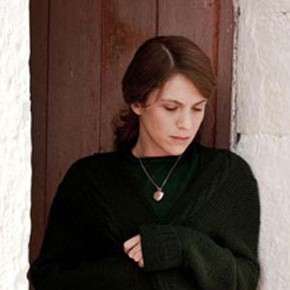
Making do in the boonies
A beginning teacher in Fifties Pugila (down toward the rugged heel of the Italian boot) gets sent far from home and far from her well-off fiancee to teach in a tiny one-room school in this first film as austere and lacking in excitement as the world it depicts. The lackluster action is offset by the sprightly, natural turn of rising star Isabella Ragonese in the main role of Nena. Ragnese also appears in two other new films chosen to be in the 2011 New Italian Cinema series, Our Life and One Life, Maybe Two, though it's only in this one that she has the major role. Unusual for a young leading lady in being rather plain, she is a little like Betsy Blair of the memorable Fifties films Marty and Calle Mayor: beyond the plainness, there is a poise and presence and something potentially touching and sad about her that holds one's attention.
She's given precious little to do here, however. There is a subtlety about the film and it has cute little touches provided occasionally by Nena's small students in the rural school, but there is very little talk, many of the scenes are made less involving by being shot from the middle distance, and there are no interesting characters other than Nena herself. The fiancee, Francesco (Alberto Boll), is a virtual nonentity. Then when his taking up with a wealhy woman leads Nena to sleep with a local handyman and she must harry him, we get the earthy but noncommittal Giovanni (Francesco Chiarello, another newcomer, like Boll), who may have a pulse, but just barely. In his review of the film for Variety at Venice in September 2010 Jay Weissberg wrote: "Playing it safe at every turn, Cecere turns in the kind of unexceptional drama, light and only mildly entertaining, that fills up satcast movie channels condescendingly geared toward women." He calls the film "unexciting and uninvolving."
Mostly Nena's story is about making do in the boondocks. She seems contemptuous of the villagers and then gradually seems more and more willing to put up with them. She goes from being considered unfit to teach to getting congratulated by an education administrator for her good work. The ragtag urchins (who are little represented but very cute) turn out to be teachable. But what about Francesco, who has changed everything by meeting another more upper class woman? The ending of the film is ambiguous. Cecere's film storytelling is so understated that at times it feels like it isn't clearly stating anything.
The odd coolness of the style, which sets it apart from most Italian films, may explain how Cercere's debut came to be received reportedly with great enthusiasm at Venice. Let's hope future work justifies this interest. The First Assignment/Il primo incarico, however, is not likely to make a big splash in the world at large, apart from some critical success. Despite a confident, though intentionally understated, turn by Isabella Ragonese, there's virtually no there there.
Cecere was nominated for the Controcampo Italiano Prize at Venice, and Ragonese and the production designer Sabrina Balestra received nominations for the Silver Ribbon at the Italian National Syndicate of Film Journalists. Screened for this review as part of the San Francisco Film Society's presentation of New Italian Cinema, a series shown Nov. 13-20 at Landmark's Embarcadero Center Cinema in San Francisco.
-
ALESSANDRO ARONADIO: ONE LIFE, MAYBE TWO (2011)
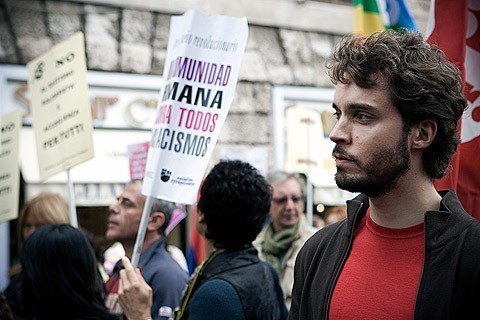
LORENZO BALDUCCI IN ONE LIFE, MAYBE TWO
Two roads diverged....
In his first feature One Life, Maybe Two/Due Vite per Caso, Arnadio treads the familiar path of alternative lives ŕ la Sliding Doors. The variation is that this takes us into the very contemporary world of a young middle class Italian with ordinary prospects and some rough experiences ahead of him. The film opens up when two guys rear end a cop car. Or, more accurately, there are two alternative lives that split off when Matteo (rising young star Lorenzo Balducci) has to brake for a stationary car. In the action-packed first version, he hits it, and he and his friend are beaten by the plainclothes cops, particularly one plainclothes cop (Ivano De Matteo), and he is taken in and charged; his friend Sandro (Riccardo Cicogna), who has cut his finger, goes to the hospital. This sends Matteo's life in a certain direction, he stays at his job in a plant nursery, and besides pursuing his own case, he gets involved in radical politics. In the other version, he stops just short of hitting the car and there's no unpleasant confrontation with the cops.
In this life, he gets fed up with his lack of prospects in his job and goes into training with the Carabinieri, the national police force. The film goes back and forth with sequences of the two alternative lives, using a more saturated palette to distinguish one life from the other. Certain events are independent of whatever Matteo does and exist in both versions, such as the heart attack of his father Pietro (Teco Celio). A Czech named Ivan (Ivan Franek) met in a bar seems to invade Matteo's life bringing a trail of sleaze. There are two women in Matteo's life,. He has a crush on a pretty barmaid, Sonia (Isabella Ragonese, of The First Assignment), at the club he and his friends hang out at, Waiting for Godard. He has also met and become involved with a girl from a good family, Letitia (Sarah Felberbaum, of The Jewel). The core idea is that a guy his early twenties doesn't know where he wants his life to go and it couls spin in many different directions; and the story appeals to young audiences in the same situation. On the other hand, Matteo seems to encounter frustration and anger and end in violence in both versions, whether he rear ended the cop car or not. The film is freely based on a story by a story by Marco Bosonette, "Death of a Confused 18-Year-Old," and references Truffauts 400 Blows, particularly the freeze-frame ending down by the beach. The handsome, sweet-faced Balducci seems like victim being prepared for slaughter in harsh economic and political times.
If you watch for philosophical profundities or even telling interrelationships between the two alternative narratives you will not find them. If, on the other hand, you watch for scenes of how Italians live, work, and talk now, this movie is fresh and alive and well made. Above all you can watch it for views of the appealing and handsome young star Lorenzo Balducci as Matteo, and he does a good job of seeming like the same guy in both narratives and thus providing a unifying strain. The film reads better as a series of somewhat unrelated slices of life than as a consistent or enlightening narrative. But Aronadio has a conclusion: he brings his two alternative lives together a the end to suggest that despite variant actions, a person's path winds up in the same place.
Theis is a highly competent work but is also unfortunately yet one more example of the fact that the once great Italian film world has lost its once distinctive and powerful direction; the effect for all the skill in shooting scenes winds up feeling overall a bit timid, tentative, and sketchy. Whether or not Aronadio will develop a distinctive style and viewpoint remains to be seen. However, this film shows mainstream talents and Alessandro Aronadio has an excellent background.
Born in Rome in 1975, Aronadio has written fiction and scripts for film, and is a photographer with a degree in psychology who wrote a thesis on David Cronenberg. He studied film in LA on a Fulbright fellowship. He has worked with Luc Besson, Giuseppe Tornatore, Mario Martone, Roberto Andň, and in the US on a series of independent productions. He also directed commercials, videoclips, short films, and documentaries.
One Life, Maybe Two was screened for this review at the New Italian Ceinema series produced by the San Francisco Film Society at Landmark's Embarcadero Cinema, Nov. 13-20, 2011. Due vite per caso debuted at Rotterdam in January 2010 and was released in Italy May 7, 2011. Also shown at Berlin and at Cannes (out of competition). Jonathan Pacheco's The House Next Door (Slant) has a smart discussion of this film written in connection with its showing in NYC in June 2011 as part of the Open Roads Italian film series at Lincoln Center.
Last edited by Chris Knipp; 08-03-2014 at 03:05 AM.
-
AURELIANO AMADEI: 20 CIGARETTES (2010)
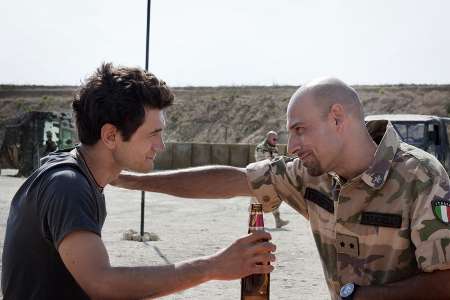
VINICIO MARCHIONI AND ALBERTO BASALUZZO IN 20 CIGARETTES
Film slacker's Iraq war tale
20 Cigarettes is autobiographical account in three parts of an experience of the then 28-year-old Amadei in Iraq in 2003. Based on the book he co-authored with Francesco Trento, Venti sigarette a Nassiriya (Twenty Cigarettes in Nassiriya, Einaudi), the film is lively but patchy and uneven in its tone. In its attempt to be amusing about deadly serious matter, in some parts it's curiously tasteless, strange, and off-key. There is the danger of a kind of pathetic fallacy here that the film falls prey to almost immediately and recovers from imperfectly -- of feeling as frivolous and half-cocked as its protagonist is pretty much all through. The fact that the tragic event he gets inadvertently involved in was big news in Italy adds considerable interest to the film for Italians. The tonal issues and choppiness are minuses for others.
From the start the smiling, curly-haired Aureliano (Vinicio Marchioni) seems like an overgrown child, playing games with a camera in his hand. It's telling that when he goes to Iraq, completely on a whim, he forgets to bring his camera long, though using it was the purpose of the trip. A sometime anti-war demonstrator who escaped military service by pretending to be gay, Aureliano has vague filmmaking aspirations, but he's far from there at this point. Boyd van Hoeij of Variety <a href="http://www.variety.com/review/VE1117943441?refcatid=31">calls</a> this story "the incredible (and incredibly irresponsible) work experience of an Italo slacker." The Italian soldiers he's around, evidently not key to Bush's "shitty war" (as A. calls it) are goofballs too. Aureliano goes because his mother is friends with director-producer Stefano Rolla (Giorgio Colangeli), who wants to do a fiction feature in Iraq and is asking her to donate $5,000 and offering the smiling 28-year-old aspiring filmmaker boychick a chance to come along. "It'll be a real job," says his mom (Orsetta de Rossi, a Laura Dern lookalike). "Not as an actor, though," Aureliano protests. He's supposed to go in a couple of days. But he's about to be in a demonstration against the Iraq war.
Good story.
And very soon after he gets there, Aureliano gets blown up in a suicide bombing. Yet he survives. And that's the payoff.
In the first section taking the protagonist from his slacker life to a truck bombing in Iraq, the film is good at making great leaps. It jumps back and forth between the Rome takeoff and the Iraq arrival, the swinging handheld camerawork evoking the good natured recklessness of the protagonist. He's got a spoiled life, with a ditzy but simpatica upper bourgeois mamma and two girlfriends, lovely "best friend" Claudia (Carolina Crescentini), whom he occasionally has sex with, and an official "fidanzata" from Rio, the superstitious Angela (Desirče Noferini, merely glimpsed).
Amadei's signal of the absurdity of the desert combat zone of Nassiriya, with its US PX "megastore" and Burger King, is that when he's off the plane and wants a cigarette, he has to go off to a tiny island of confinement surrounded by sandbags as a "smoking area." The conclusion of part one is an atmospheric collection of trivia as Aureliano settles in with the soldiers and Rolla, his boss, Massimo Ficuciello (Alberto Basaluzzo), their official bodyguard, who's the more sympathetic because he's a reservist, not regular army.
20 sigarette has in common with David O. Russell's Three Kings a sense of the palpable harmony between the absurdity of the Iraq war setting and the unpredictable danger it harbors. Frivolity is jammed up willy-nilly with seriousness. The picture's location shooting (actually filmed in Morocco) has a realistic feel, and so does the explosion, which comes in part two. The first part of part two is shot literally from Aureliano's P.O.V., initiated by having Aureliano wipe the sand out of his eyes and reopen them. This intense P.O.V. makes the truck bombing and Aureliano's injuries more vivid. Though the modest budget keeps this from being as rich in detail and context as The Hurt Locker, Amadei deserves much credit for creating an intense battle sequence midway.
According to a Guardian <a href="http://www.guardian.co.uk/world/2003/nov/12/iraq.italy">report</a> the Nov. 12, 2003 Nassiriya bombing killed 25. Included were 17 Italian soldiers and military police and two Italian civilians, including Stefano Rolla, the director of the film Amadei was supposed to work on, and at least eight Iraqis. When this happens 20 Cigarettes jumps momentarily into horror movie style, with Aureliano panting and groaning, the screen filled with his blood-covered arm clawing its solitary way forward through the rubble. After that: hysterical soldiers, objects, chaos, tragic news, an American hospital, and a few more cigarettes.
Part three is the aftermath back in Italy starting three days later as Aureliano recovers from trauma and leg injuries, a badly mangled ankle. In the Rome hospital, after all the moaning and weeping that's gone before, comedy abruptly returns with Tino (Edoardo Pesce), a clownish male nurse who offers to give out cigarettes and joints to all patients. Aureliano is now a hero because he miraculously survived, and a media circus surrounds him, along with squabbling with other survivors and maudlin moments.
Amadeo the director lacks the dry touch necessary to carry off comedy while presenting a tragic incident of war. His account of his own experience is vivid but jarring and overdone.
20 sigarette debuted at Venice Sept. 5, 2010 and had its Italian release Sept. 8. It was screened for this review as part of the New Italian Cinema series (Nov. 13-20-, 2011) presented by the San Francisco Film Society at the Embarcadero Center Cinema.
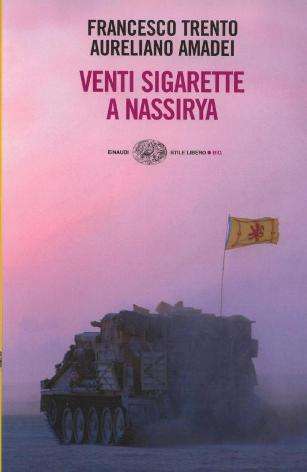
THE BOOK
-
FRANCESCO FALASCHI: THIS WORLD IS FOR YOU (2011)
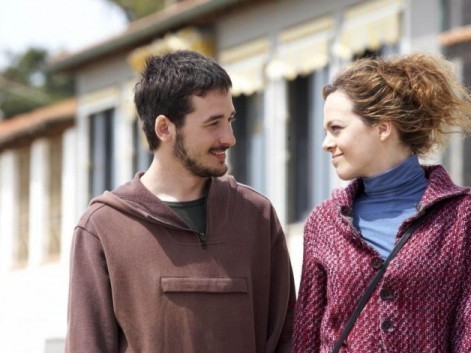
MATTEO PETRINI AND EUGENIA COSTANTINI IN THIS WORLD IS FOR YOU
A young man's airy journey
This pleasant new film, Falaschi's third feature, set in northern Italy, along the Tuscan coast, is as buoyant and directionless as its protagonist, but also as charming. This World Is for You and its protagonist, Matteo (Matteo Petrini) both have the quality Italo Calvino listed in his "Six Memos For The Next Millennium" as one of the essentials of writing: Leggerezza, lightness. The film floats along as light as a feather. Only see if you can remember it after.
The subject is another handsome young man, this one, Matteo, 19. (Petrini is a natural, a sort of Italian Joseph Gordon-Levitt.) Matteo is just passing his exams and definitely not wanting to go into the fish business of his father Paulo (Paolo Sassanelli), with whom he lives, but otherwise without a definite plan. Teo's mom (Cecilia Dazzi) lives elsewhere, and she's light too, a bit of an airhead, and both parents are on the young side. Teo wants to be a writer, and to pursue this interest he has applied to a certain Carver school, which costs 7000 euros a year.
Teo's interview project with old men leads him frequently to the cenetary. There he meets his future girlfriend, Chiara (Eugenia Costantini, lovely). Meanwhile his father's minor accident in his truck leads him to a hospital stay and the diagnosis of leukemia. The result: Teo must work. Using a phone at a collection call center doesn't appeal much, so he shifts to the project of a floating outdoor movie theater. From there he moves to being a waiter at a restaurant overlooking the sea. We follow Teo's job hunt and alongside that we watch his relationship with Chiara develop. It's light -- leggerezza prevails in both story lines. Chiara's an independent and smart girl. Her self-assurance intimidates Teo a bit, but also perhaps attracts him. She's studying viniculture, and threatens to transfer to Armenia to track down the first grapes used by man to make wine. She wants Teo to come with her. He doesn't commit. Eventually, though they work something out.
Those qualities Calvino listed are hard to pin down. How well does Falaschi capture the other five, quickness, exactitude, visibility, and multiplicity? Well, there certainly is quickness -- things movie along breezily enough -- and one hopes there is some degree of exactitude. As for visibility I'm not sure what that means (though almost all the action is filmed out of doors), and multiplicity may be asking too much of such a modest, and modestly budgeted, movie. Teo narrates, and pay attention to the letters he writes to Chiara. They turn out to be more useful than he had originally planned.
Italians today may have more lightness than they need. It's not exactly like Calvino was challenging his countrymen to become Germans.
The San Francisco Film Society presented Questo mondo č per te in its international Premiere at its 2011 New Italian Cinema series, Nov. 13-20, at Landmarkk's Embarcadero Cinema.Italy 2011, 82 min. Written by Filippo Bologna, Francesco Falaschi, Stefano Ruzzante. Photographed by Gianni Giannelli. With Matteo Petrini, Eugenia Costantini, Fabrizia Sacchi, Massimiliano Bruno. Videofactory. The film was released in Italy April 1.
Last edited by Chris Knipp; 08-03-2014 at 03:06 AM.
-
RICKY TOGNOZZI: THE FATHER AND THE FOREIGNER (2010)
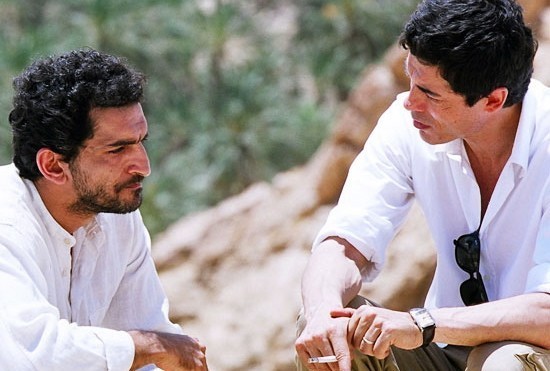
AMR WAKED AND ALESSANDRO GASSMAN IN THE FATHER AND THE FOREIGNER
Male bonding goes awry
From Ricky Tognazzi, prolific son of famous Italian film actor Ugo Tognazzt (who won the Best Actor award at Cannes in 1981), comes this movie about male bonding and handicapped children that for some reason morphs into a halfhearted stab at a crime thriller, or at least that's how the genre-mixing feels in this too-many-cooks adaptation of a novel by Giancarlo De Cataldo (Einaudi, 1997); another of De Cataldo's novels was the basis for Michele Placido's 2005 directing debut, Romanzo criminale. Tognazzi has been good before at handling male friendship, but the botched screenplay buries that skill. Like his father, Ricky Tognazzi has done more acting than directing, and this is the first feature he's directed in seven years. De Cataldo collaborated on the screenplay; it hasn't helped much.
Here, the handsome, troubled-looking Alessandro Gassman again plays a man attracted by the Near East, as he did fourteen years ago in Ferzan Özpetek's debut Steam: The Turkish Bath (1997). This time it's a warm-hearted Syrian Arab man called Walid (Amr Waked), apparently some sort of businessman, who draws him in and impresses with a deep love and compassion for his handicapped baby that Diego (Gassman) can't muster for his own disabled son. The two men meet by sharing a smoke at a center where their children are being treated and Walid's selfless love for his child is later evident. ( Later, they share intimate secrets in a steam bath, recalling scenes in Pamuk's film, but without the homoerotic element.) Diego, a fidgety government functionary, is uneasy around his child Giacomino (Leonardo Della Bianca) and jealous about the way his wife Lisa (Kseniya Rappoport) achieves moral superiority by monopolizing their son's care. She soothes and adores the child, while Diego sits in another room feeling uneasy glancing in a document his new friend Walid has unintentionally dropped in the courtyard where the met.
The connection between the two men linked by their handicapped sons is strongly established (too bad it fades later as the focus shifts). Within twenty minutes it's also established that the charming, friendly, and much calmer Walid's involved in fishy business. Walid tools around in a small chaufeured Audi, and sends an Arab babe called Zaira (Lebanese director Nadine Labaki) to sweep Diego off on an unscheduled trip to the Middle East. Diego gets willingly dragged off by his super-rich friend to various exotic and mysterious affairs and celebrations. Tognozzi does his exotic orientalist mumbo-jumbo well enough. It's all mysterious. Eventually Walid, who isn't really Walid, vanishes into thin air, and the authorities come to Diego for help in finding him.
But through all this, as the interesting parents of handicapped children drama gets swept off and turned into a fancy photo exhibit by Diego's wife Lisa, it all becomes a muddle. The filmmakers in adopting this novel needed to do some juggling that involves keeping some very different balls in the air, and it fails. As one Italian reviewer wrote, it's as if there were trying to meld Gianni Amelio's The Keys to the House with Tony Scott's Enemy of the State. I like Gassman here. He's a little like Joseph Cotton in The Third Man, the good chap drawn into malfeasance he can't understand, but sterling and able to stand his ground. Graham Greene might have whipped this screenplay into shape. Unfortunately he wasn't available.
This film seems a throwback to the days when all Italian movies were dubbed. You can see lips moving out of sink, especially in the case of Amr Waked. Waked, who is well known in his native Egypt and appeared in Yousry Nasrallah's Felliniesque The Aquarium (SSIFF 2008), and deserves better. So does everybody in this polished production with its handsome use of both Italian and Middle Eastern locations.
Written by Ricky Tognazzi, Giancarlo De Cataldo, Simona Izzo, Graziano Diana. Cinematography by John Canevari. Editor: Carla Simoncelli. Set Design: Mariangela Capuano. 110 min. Released in Italy February 18, 2010. Screened for this review as part of the San Francisco Film Society's New Italian Cinema series presented at the Landmark Embarcadero Cinema Nov. 13-20, 2011. This was the film's North American premiere.
Last edited by Chris Knipp; 08-03-2014 at 03:12 AM.
-
This appeared over a month earlier in a Paris movies thread.
NANNI MORETTI: HABEMUS PAPAM (2011)
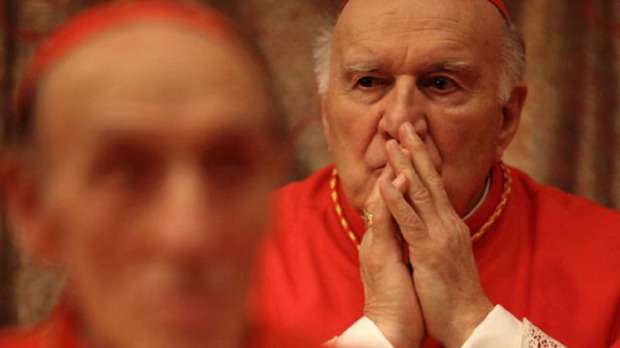
MICHEL PICCOLI IN HABEMUS PAPAM
Lord, I am not worthy
Mike D'Angelo's Cannes AV Club report (as often happens) got it right: Nanni Moretti's new Habemus Papam is "slight but amusing, and often oddly touching." There is charm and something thought-provoking about this film, but those expecting some strong anti-papal satire will be disappointed. The title is what they declare at the Vatican (Latin for "We have a Pope") when a new Supreme Pontiff has been elected by the College of Cardinals. And the slim tale, in full Vatican dress, concerns a new His Holiness (Michel Piccoli) who feels too unworthy and can't go out to the balcony and face the faithful. Moretti himself plays a psychiatrist called in to figure out what's going on, who, when the electee escapes and wanders around Rome, becomes an activities leader for the cardinals focused on a volleyball tournament. As anybody will tell you, not just Mike, it's Piccoli who makes this "oddly touching," and even more. Piccoli is an immense yet modest presence, sad, timid, sweet, and wishing he'd become an actor. About that, he need not worry. Piccoli again proves that he's one of the great ones.
The spectacle of the men in red lined up and voting is impressive indeed, sequestered in a convincing mock-up of the Sistine Chapel at CineCittŕ, but it's hardly what you'd call exciting. The title means "We Have a Pope," or as D'Angelo more colloquially translates it, "We got us a pope." They don't have one at first. There are a series of votes, with the traditional puffs of black smoke sent up to tell spectators outside they have not succeeded, till finally votes (thought this isn't explained) are switched to a neutral candidate from competing favorites and Cardinal Melville (Piccoli) wins and shyly smiles in acceptance, or just unwillingness to protest. When he refuses to publicly announce his own election, however, the Vatican cannot report it to the press, or anyone. They put a fat Swiss guard in the pope's rooms with instructions to walk back and forth and cast a shadow on the curtains now and then so people think the new pope is there. And that's when shrink Moretti and later Margherita Buy are called in to talk to the reluctant cardinal.
It's true I suppose as D'Angelo says that at first it seems Moretti "will be the Geoffrey Rush to Piccoli’s Colin Firth," but both the charm and the weakness of the film is that nothing is going to happen. When the female shrink comes in (Buy) and the cardinal loosens up a bit and admits he always wanted to be an actor, this is when things begin to click. The film becomes a kind of loosely-slung parable about responsibility and facades and role-playing. There's much ado from Vatincan front men (particularly one energetically played by Jerzy Stuhr), who keep the balls in the air, when really nothing is happening.
In the end Moretti's improvisational screenplay doesn't do what it could either with the drama of the narrative or the implications of the situation. Given the total control in the Vatican, it's implausible that the cardinal could be moved out to see the female shrink (comically cast as Moretti's character's ex-wife), and more implausible still that he could wind up wandering around and enter a theater with a troupe of actors rehearsing Chekhov's The Seagull, which he just happens to know by heart. Perhaps Moretti should have left this kind of thing to Rivette.
The sets and f/x and costumes work well to make the predeedings seem actually to be transpiring at the Vatican. The casting is fine. But you watch this because it's a great role for Piccoli, not for many other reasons. This is just a narrow conceit, floated out and allowed mostly to drift.
Habemus Papam was released in Italy in April, shown at Cannes in May, and subsequently at a number of international festivals. It opened in France September 7 and opens in the UK December 2, 2011. Screened for this review at MK2 Hautefeuille, Paris, on October 18, 2011.
-

Some comments on the San Francisco Film Society's New Italian Cinema Event, 2011 edition.
This was a very enjoyable series to watch, for me, and full of relevant stuff. The selections included many films that dealt with contemporary issues and there was no dead wood, nothing that was self indulgent or an obvious misfire. That quality of relevance was present even in some of the more problematic choices. 20 Cigarettes (though it got several Italian film awards this year) is very uneven in tone but it does deal with the Iraq war. The Father and the Foreigner winds up being rather muddled but it does touch on handicapped children and the Middle East. The ax-to-grind comedy Some Say No might be accused of trivializing the huge issue of Italy's national dependence on graft and favoritism, but maybe its sugaring of a bitter pill is strategically wise. Anyway, the issue it exposes is definitely a central one.
Our Life; One Life, Maybe Two; even the Fifties-set First Assignment focus on work problems. Our Life again confronts Italian graft and nepotism, on the working class level, as well las the plight of foreign workers. The issue is present in Some Say No, which asserts that the best qualified can't get the jobs they deserve. A very young man is wondering what to do in Francesco Falaschi's lightweight but charming This World Is for You, which considers the more basic and universal issue of someone whose artistic ambitions are deemed impractical.
Graft, the mafia, nepotism, joblessness, immigrant problems, and other issues were much in evidence, but there was no Il Divo or Gomorrah. Were those powerful, distinguished new Italian films just flukes, 2009 a fluke year? The Jewel, which, with names changed, describes the scandalous Parmalat bankruptcy, lacks the kind of acid wit, fast pace, and economy you get in films like The Social Network or In the Loop. The Jewel gets sidetracked too often, and since the director Andrea Molaioli's The Girl by the Lake (though it got a raft of Donatello awards in Italy) rambles too much, you wonder if Molaioli really knows how to tell a story. One can almost say that of Matteo Garrone's Gomorrah, but his Neopolitan gangster epic is energized by its rage. There was not much rage in evidence this year, not the kind of boldness one finds in Latin American films.
There was instead an epic timidity -- exhibited in the adorable performance of the splendid Michel Piccoli playing a shy Pope-elect who runs away from the prospect of ruling the Vatican in Nanni Moretti's droll but toothless Habemus Papam. As there was no rage there also was no real jewel in the series, not even a "little jewel," the actual title of that movie about Parmalat, Il gioiellino. It's difficult to pick a winner -- nothing emerged of the caliber of The Double Hour, the terrific character-driven, and mind-boggling, noir thriller-plus-romance by newcomer Giuseppe Capotondi, the standout from last year's series, which got a US run.
The series audience's City of Florence Award vote for Claudia Cupellini's bland directorial debut The First Assignment, a nostalgia piece about a schoolteacher in Puglia, was hard to figure (despite its positive reception at Venice last year). For me it would be hard to choose a best film. It was a pleasure just to watch the brilliant Toni Servillo at work again in two leading roles, both as a crabby executive in the true-to-life scandal movie, The Jewel, and as a man living under cover in the subtle mafia thriller, A Quiet Life.
Some high profile items were missing. We didn't get to see Italy's 2012 Best Foreign Oscar entry, Emanuele Crialese's Terraferma. True, Jay Weissberg of Variety, who saw it at Toronto, wrote that it's just a well-made film with "no crying need to be at a major film festival," but it would be nice to know about it. I also was hoping to see Saverio Costanzo's The Solitude of Prime Numbers, which was made from Paolo Giordano's bestseller and features Isabella Rossellini. That one was included in New York's summer version of this series, Open Roads. The June Lincoln Center series typically included more new films (15), with only two overlaps, 20 Cigarettes and The First Assignment. Prime Numbers got a raft of best acreess nominations for one of Italy's hot actresses, Alba Rohrwacher. The source novel by Paolo Giordano has been much read both in Italy and the US.
Speaking of Rohrwachers, Alba's sister Alice's directorial debut Corpo Celeste trumps anything shown here. It is another film that could be seen at Lincoln Center this year, not in the Italian series in June but with the high honor of being chosen as one of the 28 official selections of the New York Film Festival.
Italian cinema today, which is widely acknowledged to be sadly declined from its glory days, excels at chronicling generations, which is what you get with Muccino's early films and Marco Tullio Giordana's The Best of Youth. Daniele Luchetti (honored with a tiny retrospective) is taking stabs at this activity in his energetic but rather hasty new film Our Life (Best Film and Best Actor awards in Italy this year), and so is Alessandro Aronadio in his sliding-doors fantasy, One Life, Maybe Two.
What do we have to look forward to? Muccino, superficial perhaps but an accurate chronicler of his (Roman) generation, has defected to Hollywood too long perhaps. But Matteo Garrone seems to grow with each film, and he has a new one coming called simply Big House, that is , reputedly, an examination of the Italian TV industry. For me Gianni Amelio is one of the real living Italian masters. Since the touching Keys to the House, Amelio has made two films. The Missing Star (2006), debuted at Venice, not seen here, sounds dubious. But his 2011 film, The First Man (which debuted at Toronto this year), based on Camus' unfinished autobiographical novel about returning to Algeria, won the Fipresci Prize, and despite one critic's writing that it's "excessively subdued" -- Amelio may have yet to return to the power of his best work -- it surely is beautifully crafted (even if it's in French).
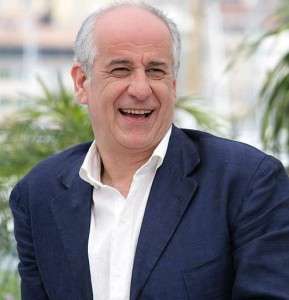
THE AMAZING TONI SERVILLO.
Last edited by Chris Knipp; 11-30-2011 at 09:04 PM.
 Posting Permissions
Posting Permissions
- You may not post new threads
- You may not post replies
- You may not post attachments
- You may not edit your posts
-
Forum Rules





 Reply With Quote
Reply With Quote












Bookmarks